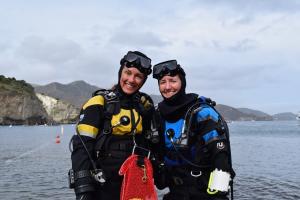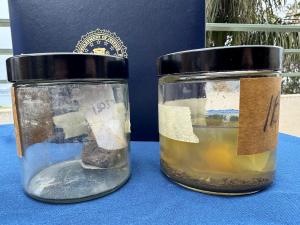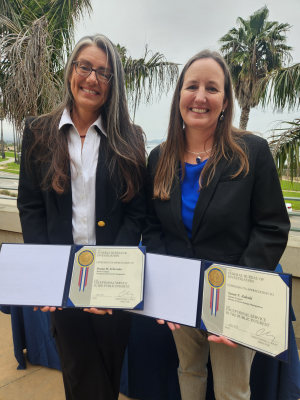When Donna Schroeder received a call on behalf of the Department of Justice (DOJ) and the Federal Bureau of Investigation (FBI) in 2021, she knew something big was on the horizon. Little did the BOEM marine ecologist know that her next dive would involve cracking open a criminal case.
Divers in BOEM’s Scientific Diving Program have embarked on countless adventures, from archaeological digs to biological surveys (see sidebar). But the 2021 call was different. The DOJ and FBI were seeking the expertise of BOEM’s scientific divers to aid in the investigation of the Huntington Beach Oil Spill in October 2021.
The spill – caused by a seafloor pipeline break at oil and gas Platform Elly, operated by Beta Operating Company, LLC (a subsidiary of Amplify Energy Corporation) – required more than just surface-level examination. Investigators needed a timeline to build a case against the responsible parties. That’s where Schroeder and her colleague, and BOEM diving safety officer, Susan Zaleski came in.
Teaming up with the FBI’s Underwater Search and Evidence Response Team (USERT), Schroeder and Zaleski embarked on a series of dives from October to December 2021.
"The accident scene was in water around 104-108 feet, pretty deep for standard scuba equipment, and in an environment that was dark with low visibility," Schroeder recalled. Due to the depth, dives could only last 12 minutes and divers were limited to only 2 to 3 dives per day, making every second underwater precious.
To ensure the dives were effective, pre-dive planning was critical. "We had to discuss all potential options with investigation partners to be prepared for a scientifically robust and legally defensible data collection," Schroeder noted. This meticulous preparation paid off. The dive team videotaped every action and maintained a strict chain-of-custody protocol for the collected evidence to ensure the integrity of the findings.
The divers were given extensive responsibilities: designing a data collection plan, gathering evidence, and assisting in data interpretation. Remarkably, this collaboration marked the first-time that the age and diversity of benthic fouling species - such as barnacles and tubeworms - were used in a criminal investigation to establish a timeline of events.
Their efforts did not go unnoticed. On April 19, 2024, both Schroeder and Zaleski were awarded the FBI Director’s Certificate Award at a ceremony in Santa Barbara, California. This prestigious award recognizes exceptional achievements within the United States Intelligence Community, highlighting the extraordinary contributions of both divers.
The Huntington Beach Oil Spill investigation underscored the crucial role of BOEM’s Scientific Diving Program in safeguarding our oceans and holding those who harm them accountable. Schroeder’s and Zaleski’s story is a testament to the power of meticulous scientific work in the pursuit of justice.
For an in-depth outline of the investigation and the criminal case, go to Investigating Environmental Crimes: The Huntington Oil Spill — FBI.
BOEM’s Scientific Dive Program
BOEM’s Scientific Diving Program began in the 1970s within the Department of the Interior in response to the National Environmental Policy Act (NEPA) of 1969. Protecting sensitive natural and cultural resources from Outer Continental Shelf (OCS) oil and gas activities has been a focal point since then. "Our highly trained scientists and skilled research divers serve as the underwater eyes and ears of BOEM-funded research and studies," said Susan Zaleski, BOEM’s diving safety officer. The program includes nine divers from various OCS regions, consisting of marine archaeologists, biologists, geologists, and environmental scientists, all of whom must maintain diverse diving certifications and experience.
This story is part of the “Unleashing the Science” series, showcasing how bureaus within the Department of the Interior produce and apply science to ensure responsible management decisions for our planet now and for the future.
--BOEM--
The Department of the Interior’s Bureau of Ocean Energy Management (BOEM) manages development of U.S. Outer Continental Shelf (OCS) energy, mineral, and geological resources in an environmentally and economically responsible way.




